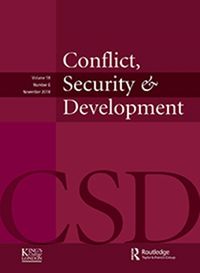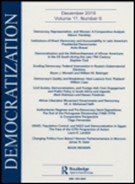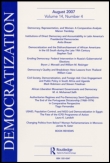Pro-Democracy Movements in a Comparative Perspective: A Frontiers in Political Science Research Topic
Why do political activists (and especially their movement’s leaders) fight against dictatorship and for political change even under high risk of imprisonment, torture or capital punishment? Given the repertoire of intimidation and repression available to authoritarian incumbents, fighting against their rule can come at a high cost, endangering the well-being of individual activists as well as that of their closest allies. The fate of pro-democracy activists in Belarus, Russia or Hongkong provide striking examples.Scholars from different disciplinary angles investigate political activism in autocracies. Studying the emergence, and endurance of political activism and social movements, scholars from sociology and political science focus on political opportunities such as regime structures, socio-economic context, and external support, as well as pre-existing social networks, previous protest experience, and existing communication channels to explain political activism. Anthropologists and ethnologists investigate political activism as a socio-cultural practice that is strongly rooted in local contexts while being also mobile beyond national borders. Researchers in the field of political psychology prefer to highlight personality traits, values, attitudes, and self-attributed personality characteristics to study individual activism. This Research Topic intends to comprehensively analyze and explain the reasons, motivation and mobilization mechanisms of political activism and its leadership in autocracies for a broad social science audience.
With the following contributions:
- Pro-democracy movements in a comparative perspective by Sonja Grimm & Sebastian Hellmeier & Jan Matti Dollbaum & Véronique Dudouet
- Activists Against Autocrats: TSMO Networks and Democratic Diffusion by Jonathan Pinckney & John Joseph Chin
- Civil Society and Pro-Democracy Social Movements: Troubled Relations Within Authoritarian Regimes? by Murad Nasibov
- Sullied: The Albanian Student Movement of December 1990 by Arjan Shahini
- After the Revolution: State, Civil Society, and Democratization in Armenia and Georgia by Christoph H. Stefes & Yevgenya J. Paturyan
- People-Powered and Non-Violent Social Movements: Forcing Gradualist Democratic Reforms in Authoritarian Societies by Stephen Zunes
- The Dynamics of Social Movements in Unrecognized States—A Comparative Study by Hilmi Ulas
This research topic (equivalent to a "special issue") is edited by Sonja Grimm, University of Konstanz, Sebatian Hellmeier, Social Science Research Center Berlin, Jan Matti Dollbaum, University of Bremen, and Véronique Douduet, Berghof Foundation.
Domestic Elites and External Actors in Post-conflict Democratization
A Conflict, Security and Development Special Issue. Vol. 18, No.4 (July 2018)
Following the end of the Cold War, post-conflict democratisation has rarely occurred without significant international involvement. As a consequence, scholars have explained the outcomes of post-conflict democratisation foremost with an examination of external actors, their mission mandates, and their capabilities and deficiencies. A special issue for the journal Conflict, Security and Development edited by Sonja Grimm and Brigitte Weiffen innovatively sheds light on the domestic side of post-conflict democratization.
Two theoretical (Grimm/Weiffen; Zürcher) and three empirical (Groß; Bunk; Zimmermann) contributions to this issue focus on the domestic elites, their preferences and motivations, as well as their perceptions of and their reactions to external interference. They find that particularly the patterns of external-internal interactions may explain the trajectory of state-building and democracy promotion efforts. Empirical evidence is taken from the universe of cases of international peace building missions (Zürcher) and case studies from different world regions, namely Guatemala (Zimmermann), Mozambique (Bunk) and Kosovo (Groß).
With the following contributions:
- Domestic elites and external actors in post-conflict democratisation: mapping interactions and their impact by Sonja Grimm & Brigitte Weiffen
- A theory of democratisation through peace-building by Christoph Zürcher
- Lean models, complex realities: elite interactions in post-conflict democratisation at the local level by Lisa Groß
- The dynamics of donor and domestic elite interaction in Mozambique: formal decentralisation and informal power structures by Bettina Bunk
- On our terms! How domestic elites localised the International Commission Against Impunity in Guatemala by Lisbeth Zimmermann
Fragile States: A Political Concept
A Third World Quarterly Special Issue. Vol. 35, No. 2 (April 2014)
This special issue investigates the emergence, the dissemination and the reception of the notion of ‘state fragility’. It analyses the process of conceptualisation, examining how the ‘fragile states’ concept was framed by policy makers to describe reality in accordance with their priorities in the fields of development and security. Contributors investigate the instrumental use of the ‘state fragility’ label in the legitimisation of Western policy interventions in countries facing violence and profound poverty. They also emphasise the agency of actors ‘on the receiving end’, describing how the elites and governments in so-called ‘fragile states’ have incorporated and reinterpreted the concept to fit their own political agendas. A first set of articles examines the role played by the World Bank, the OECD, the European Union and the g7+ in the transnational diffusion of the concept, which is understood as a critical element in the new discourse on international aid and security. A second set of papers employs three case studies (Sudan, Indonesia and Uganda) to explore the processes of appropriation, reinterpretation and the strategic use of the ‘fragile state’ concept.
With the following contributions:
- Fragile States’: Introducing a Political Concept by Sonja Grimm, Nicolas Lemay-Hébert and Olivier Nay
- International Organizations and the Production of Hegemonic Knowledge: How the World Bank and the OECD helped invent the Fragile State Concept by Olivier Nay
- The OECD’s Discourse on Fragile States: Expertise and the Normalization of Knowledge Production by Nicolas Lemay-Hébert and Xavier Mathieu
- The European Union’s Ambiguous Concept of ‘State Fragility’ by Sonja Grimm
- Measuring and Managing ‘State Fragility’: Statistics Production in the World Bank, Timor-Leste and the g7+ by Isabel Rocha de Siqueira
- How Sudan’s Rogue State Label Shaped US Responses to the Darfur Conflict: What’s the Problem and Who’s in Charge? by Maria Gabrielsen Jumbert
- State Disintegration and Power Politics in Post-Suharto Indonesia by Felix Heiduk
- When it Pays to be a ‘Fragile State’: Uganda’s Use and Abuse of a Dubious Concept by Jonathan Fisher
- State Fragility and Failure as Wicked Problems: Beyond Naming and Taming by Derick Brinkerhoff
Do All Good Things Go Together? Conflicting Objectives in Democracy Promotion: A Democratization Special Issue (Democratization, Vol. 19, No. 3, June 2012)
A Routledge Special Issue Book (2013)
Conflicting objectives are often problematized as challenges to the effectiveness of international democracy promotion. However, systematic research about their emergence and effects is still missing. This special issue addresses this research gap and seeks to provide conceptual and empirical answers in the field of conflicting objectives in international democracy promotion. The authors represented in this special issue investigate (post-) conflict societies, developing countries, and authoritarian regimes, attempting to identify the patterns of conflicting objectives in democracy promotion, the reasons for their emergence, and their consequences. This introduction presents a conceptual framework that pursues four aims, namely, it differentiates between two types of conflicting objectives (intrinsic and extrinsic); second it offers an approach for identification of their phases; third, it proposes reasons for their emergence, and fourth, discusses how political actors deal with these conflicting objectives. The empirical findings of the contributions to this special issue illustrate and substantiate the theoretical and conceptual reflections.
With the following contributions:
- Foreword by Thomas Carothers
- Not all good things go together: conflicting objectives in democracy promotion by Sonja Grimm and Julia Leininger
- Democracy promotion, empowerment, and self-determination: conflicting objectives in US and German policies towards Bolivia by Jonas Wolff
- Financing poverty alleviation vs. promoting democracy? Multi-Donor Budget Support in Zambia by Jörg Faust, Stefan Leiderer, and Johannes Schmitt
- Coerced transitions in Timor-Leste and Kosovo: managing competing objectives of institution-building and local empowerment by Nicolas Lemay-Hébert
- Power-sharing and democracy promotion in post-civil war peace-building by Jai Kwan Jung
- Two at one blow? The EU and its quest for security and democracy by political conditionality in the Western Balkans by Solveig Richter
- Inconsistent interventionism in Palestine: objectives, narratives, and domestic policy-making by Sandra Pogodda
- Peace-building and democracy promotion in Afghanistan: the Afghanistan Peace and Reintegration Programme and reconciliation with the Taliban by Marissa Quie
- The two sides of functional cooperation with authoritarian regimes: a multi-level perspective on the conflict of objectives between political stability and democratic change by Tina Freyburg
For more information, please see also newsletter no. 9 (2011) of NCCR Democracy (p. 16-17).
War and Democratization Legality, Legitimacy and Effectiveness (Democratization, Vol. 15, No. 3, 2008)
A Routledge Special Issue Book (2010)
Promotion of democracy in post-war and post-conflict societies became a topic during the 1990s. The special deals with the legality, legitimacy and effectiveness of military interventions where the international community of states not only felt impelled to engage in military humanitarian or peace-building missions but also in long-term state- and democracy-building. External actors particularly engaged in four modes, namely enforcing democratization by enduring post-war occupation (mode 1); restoring an elected government by military intervention (mode 2); intervening in on-going massacres and civil war with military forces (‘humanitarian intervention’) and thereby curbing the national sovereignty of those countries (mode 3) and forcing democracy on rogue states by ‘democratic intervention’, in other words democracy through war (mode 4). All empirical analyses stress the complexity and difficulties to establish democracy in post-conflict societies driven or monitored by external actors. Such an endeavour implies a comprehensive agenda of political, social, and economic methods of peace-building. However, if external actors withdraw before the roots of democracy are deep enough and before democratic institutions are strong enough to stand alone, then the entire endeavour may fail.
- War and Democratization: Legality, Legitimacy and Effectiveness by Sonja Grimm & Wolfgang Merkel
- Basic Principles of Law as Normative Foundations of, and Limits to, Military Enforcement of Human Rights Across State Boundaries by Reinhard Merkel
- Democracy through War? by Wolfgang Merkel
- Democratization and War in Political Science by Lars-Erik Cederman, Simon Hug & Andreas Wenger
- External Democratization after War: Success and Failure by Sonja Grimm
- Democratization after Civil Wars – Key Problems and Experiences by Jochen Hippler
- Democratization and Transitional Justice by Mark Arenhövel
- Democratization, State-building and War: The Cases of Serbia and Croatia by Nenad Zakošek
- Conflict Resolution through Democracy Promotion? The Role of the OSCE in Georgia by Pamela Jawad
- Democratizing a Dependent State: The Case of Afghanistan by Astri Suhrke
- The Perils and Promises of Democratization through United Nations Transitional Authority – Lessons from Cambodia and East Timor by Aurel Croissant




